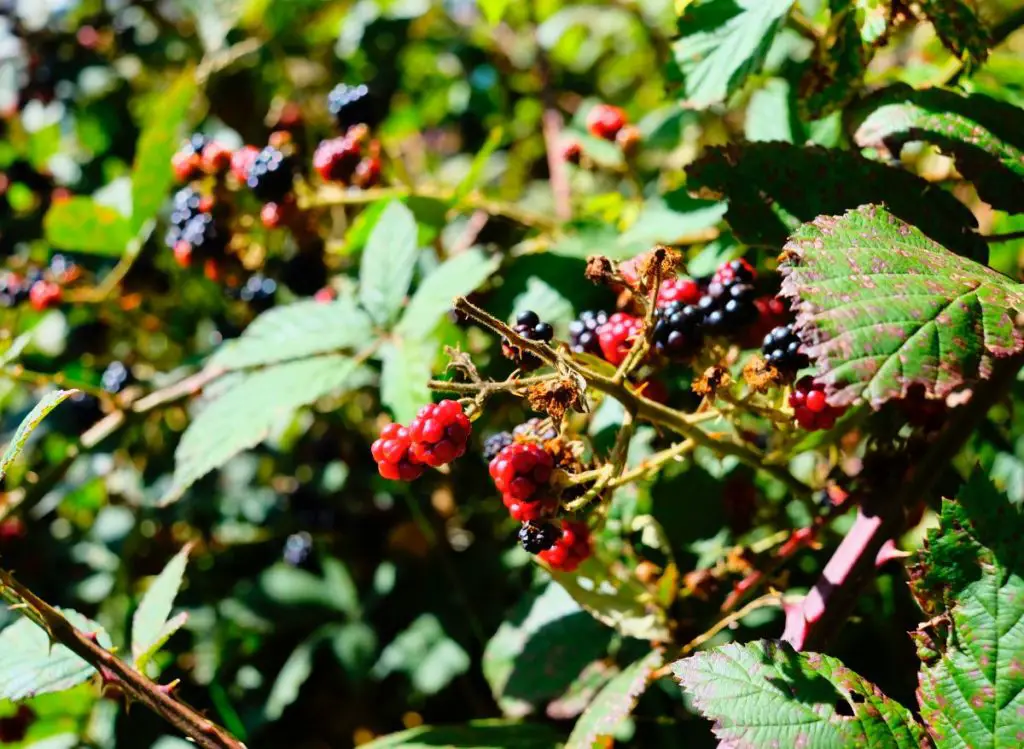This post contains affiliate links.

It can be frustrating to find out that Blackberries are invading your garden. Even for those who don’t like to use chemicals, desperation can push us to try new ways to get rid of these unwanted and annoying visitors.
This is where Roundup comes in to keep the Blackberries at bay. So, will Roundup kill blackberry bushes?
Generally, Roundup will kill blackberry bushes because it contains glyphosate, a widely used herbicide to control wild blackberries during the growing season (Souce: University of California). In addition, roundup effectively eliminates brush, vines, knotweed, scotch broom, blackberry, and weeds with waxy leaves.
The task can be challenging when killing blackberry bushes (Rubus spp.). Blackberries spread through long rhizomes, a root structure that makes killing tough and allows some species to become even weedy.
If you are interested in exploring natural ways to Get Rid Of Blackberry Bushes Effectively, I encourage you to read this Quick Guide that I wrote.
What Is Roundup® Pesticide, And How Does It Work?
Roundup is known to be the original glyphosate-based weed killer. It contains glyphosate, a widely used herbicide that helps control broadleaf weeds and grasses. According to the United States Environmental Protection Agency (EPA), there are no risks of concern to human health when glyphosate is used carefully and properly following its current label.
Moreover, Roundup is a non-selective systemic herbicide, meaning it can kill practically any vegetation by soaking in through the foliage. The plant’s vascular system generally helps carry the herbicide to all parts of the plant, including its roots; however, glyphosate will not soak into the roots through the soil; it must touch the leaves to work correctly.
When sprayed Roundup on a weed, and the spray drops on the leaves, glyphosate moves through the plant’s leaves into the phloem, and from there, it traverses to nodes of new growth and interrupts with a critical growth enzyme.
The weed needs to grow new branches and leaves to stay alive continually, and since glyphosate prevents this, the weed ultimately wilts and dies.

What Is The Best Time Of The Day To Spray Roundup?
The best time of day to apply Roundup is early morning and late afternoon in warm climates and late morning through an afternoon in the cold. Ensure you choose a calm and dry day to apply your Roundup.
Avoid applying Roundup when:
- Windy: When the product drifts away, it may damage plants you don’t want to kill.
- Raining: Some Roundup types remain effective within 30 minutes of application. You will need to reapply for better results.
- Icy conditions: Ensure that you effectively apply Roundup to the leaves
- Scorching conditions: It is essential to ensure that you spray the entire leaf, but try to avoid a runoff.
- Drought-stressed plants or weeds: Treating bushes stressed from drought might reduce the glyphosate’s ability to travel to the plant’s roots.
- When using Roundup, always wear long pants and long sleeves and carefully follow all instructions on the label.
- Ensure you keep your loved ones, including children and pets, out of the treated area until the chemical has dried.
How Long Does Roundup Take To Work On Blackberry?
It generally takes 24 hours for Roundup, particularly Roundup® Ready-To-Use Wild Blackberry Plus Vine & Brush Killer, to work on blackberry. Roundup includes several chemicals, including glyphosate, killing weeds when sprayed directly on the leaves.
The leaves allow the Blackberry to absorb the herbicide, ultimately killing it as the poison moves into the sap of the weed, carrying it throughout the entire plant.
What Is The Best Time Of The Year To Spray Roundup?
And the best time to apply Roundup is generally in spring and early summer when the temperature is between 45 to 90°F. Before the first frost, You will notice the blackberry bushes will die out.
Before Applying Roundup®, always check the weather forecast in your region. And apply Roundup when there is no rain forecast in the next 24 hours to avoid the product being blown away or washed off of the treated area.
How Long Should You Wait To Pull Weeds After Spraying Roundup?
Generally, it is recommended to remove weeds after they have died completely, which typically takes 1 to 2 weeks. It takes about one to two days for the spray to soak into the weed’s leaves and stems, which will prevent them from growing, spreading, or even reproducing more weeds.
Removing the weeds too soon after spraying them might encourage the weed to regrow from the roots. I recommend you remove dead weeds after you spray them manually.
How Long Does Roundup Stay Active In The Soil?
In general, Roundup stays in the soil for at least six months. However, the exact length of time depends on several factors, including the amount, weather conditions, and strength of the Roundup in the soil.
The United States Department of Agriculture (USDA) reveals that the half-life of glyphosate, the primary chemical in Roundup weed killer, in the soil varies from 3 to 249 days. This range means that it is still possible for Roundup to remain active in the soil for possibly over a year.
According to Cornell University, half the product can take a day to 174 days to break down in the soil. Roundup adheres to the area of soil it came into contact with, and according to Cornell University calculations, less than two percent of Roundup is lost due to runoff.
Can You Spray Roundup Around Blueberry Bushes?
You can spray Roundup around blueberry bushes at a low dose and during the fall season. Also, remember that even at low doses, Roundup can kill most plants and might not be safe to use around blueberries.
Experts from Michigan State University recommend using RoundUp to kill invasive perennials in blueberry plantings in the fall. You spray Roundup around blueberry bushes, particularly in fall, because it is the best time to kill perennial weeds with glyphosate products.
The plant absorbs the herbicide and stores it in the bark and wood of the stems and the root system. When the plant resumes its growth in the spring, the herbicide stunts new development, and if the dose is high enough, it will kill the blueberry bushes.
Does Adding Dish Soap To Roundup Help?
Adding dish soap to Roundup helps ensure a thorough coating of the leaves. In addition, adding a dye, such as Spray Pattern Indicator, is recommended to mark plants that you already have sprayed.
Also, adding dish soap to Roundup can help and might improve its effectiveness. However, dish soap does not discriminate between harmful, helpful, or harmless organisms and can hurt various soft-bodied insects and mites, both good and bad (Source: University of Florida).
The table below contains the recommended quantity of dish soap for Roundup.
| Ingredient | Suggested Concentration In a Spray Solution | 3 Gallon Bottle Size | 14 Gallon Bottle Size | 25 Gallon Botle Size |
| Roundup | 0.5 % | 2 oz. | 9 oz. | 16 oz. |
| Dishwashing Soap | 0.25% | 1 oz. | 5 oz. | 8 oz. |
| Spray Pattern Indicator | 0.25 to 0.50 % | 1-2 oz. | 5-9 oz. | 8-16 oz. |
**Spray solutions mixed in water
What Is The Best Herbicide For Blackberries?
Blackberry bushes can overgrow and extend over large areas, overtaking your gardens. The good news is that various herbicides are available to control blackberries, but not all are effective and safe.
You can eliminate blackberries from your yard with organic or chemical methods, particularly Roundup.
Here are the best herbicides for blackberries:
1- RoundUp VB02165 Ready-to-Use Assortment Bundle

2- BioAdvanced Brush Killer

3- Roundup Tough Brush Killer for Weeds, Grass, and Stumps with 24 hours Results

You might also enjoy reading this article I wrote about the most effective herbicide for blackberry control.
Wrapping Up
Overall, Roundup kills blackberries bushes, but I suggest you only use the product as a last resort.
Most gardeners, including experts from Cornell University, agree that using Chemical herbicides should be our last resort note.
Regarding weeds management, it is always better to focus on understanding the cause of the problem rather than just addressing the symptom by increasing herbicide applications.


